By Uditha Kumarasinghe Courtesy The Sunday Observer
Prof. Anil Jayantha
- We want the people to be a very active and vibrant part of economic activities
- Interest rates need to be gradually brought down scientifically based on fundamentals
Senior Advisor to the President on Economic Affairs and Finance, Prof. Anil Jayantha said the Government has proposed certain tax reforms and its tax policy is based on the basic principle of fairness, simplicity and convenience while promoting economic growth and development.
In an interview with the Sunday Observer, Prof. Jayantha said, We earnestly request the public not to panic. Your duty is to do something to stabilise the economy rather than being part and parcel of this chaotic situation. We call upon the people to do the right thing at this particular moment.”
Q: The country is emerging from its worst economic crisis. What would be the key priorities of the Government to rebuild the economy?
A: The number one priority is the country’s macroeconomic stabilisation. This paves the way for our Government to bring more investments and convert savings into investments. Our main focus is to enhance the production economy by facilitating investors to invest in many areas without any fear of losing their money. At present investors are reluctant to invest in Sri Lanka as they are highly uncertain about the future. Even if they earn profits from the business, they never know what kind of taxation would be imposed and whether the exchange rates would fluctuate.
Volatility is high and business dynamics is also highly uncertain. Our first priority is to have macroeconomic stability and financial stabilisation and then we would come to foreign exchange stabilisation. The people must be able to reliably forecast what the exchange rate would be in the future so that they can easily plan their activities. Otherwise, things would be driven by rumours and may be insider dealings would lead to a chaotic situation.
The other area is external sector stabilisation. That would help us to have a better deal with the external creditors and have more amicable discussions to progress with the IMF as well. This would help us to build adequate reserves and we have a plan for that. No matter what we do in the fiscal sector, monetary, external and social sectors, what about the people?
At present the majority of Sri Lankans are deprived of basic needs. That is why more than half of the population is in a dependent mentality and they need money. It doesn’t mean that our Government will give subsidies all the time by keeping them out of the economic engagement. We want them to be a very active and vibrant part and parcel of economic activities. Before doing that, we need to give a cash injection to them. Through social security programs, we have offered certain concessions and subsidies to make them not really stable but have a breathing space to be ready to engage in economic activities. That is our number one priority.
Q: What action can be taken to rebuild investor confidence? What is the message to investors?
A: There are many things that we can do. First, we have to eliminate myths and lies that the Opposition has created in society about us. They have created a bad image about us. They said if we come to power, we will do bad things such as confiscate things and acquire people’s property. Some people were really scared of keeping money in their bank accounts as well. We have been able to eliminate that fear. Had there been a bank run, the situation would have been terrible and that part has been overcome.
This confidence is gradually being built. You can see how this confidence is reflected in the Stock Market during the past couple of days. We will create a conducive environment for investors to bring their investments into productive channels. For example, if somebody has money and wants to invest in Sri Lanka, he expects a return on his investment.
He also looks at the risks and the facilities available. Therefore, facilitation is very important. If an investor comes to launch an innovative business but if the environment doesn’t help him to get the things cleared within a short period, he may go somewhere else. We have offered to set up a separate arm with state-of-the-art technology to get the clearances, licences and approvals and even land under a single window. Since the General Election is due to be held soon, it will take some time but some of the signs can be seen.
We have proposed certain tax reforms. Our tax policy is based on the basic principle of fairness, simplicity and convenience while promoting economic growth and development. We are ready to give some subsidies and tax relief for certain industries. We would give tax benefits and concessions to industries rather than to individuals.
The other area is when you do businesses you may come with your own equity and borrowing is needed. But if you borrow at a very high cost, you can’t run a business. Therefore, interest rates need to be gradually brought down scientifically, based on fundamentals. At present that is not happening and that is relatively very high and the people cannot afford it. Investors, mainly entrepreneurs especially in the areas of micro, small and medium sectors, were doing businesses with difficulty. They have borrowed money from banks by keeping their properties as collateral.
When something goes wrong, they don’t have any revenue to repay the bank loans and the bankers also don’t have any option. Because the country operates in an isolated manner the bankers don’t have any sympathy for businesses. Therefore, they take their properties through litigation and that is bad for the country. As a temporary measure, we would give a kind of concession or relief for investors while protecting banks as well by creating a special relief bank.
This would enable investors to revive their businesses. We have proposed a new development bank within the state banking system creating more opportunities for them to borrow at concessionary rates. Even private sector banks could follow the same thing.
The other area is the cost of production. The argument is the cost of production is very high mainly due to high salaries is not true. If you go to buy your basic food stuff, you are a little sceptical and check the prices first because you do not having an adequate income. How can we address this? This is one of the challenges. In today’s context, the cost of production is not due to high salaries but mainly due to the cost of raw materials and cost of other facilities such as electricity.
We have a plan to bring down the electricity cost not simply by giving subsidies but in substance by bringing the cost of production down with an appropriate mixture of energy sources. We are open to all the energy sources such as solar, wind power, hydro and even nuclear, and a vast array of the resources are available. With that stability, we believe the investors would see low volatility and risk and more potential opportunities. As of now, we have not explored the market. The main investors cater for the local market.
If we really want the economy to flourish and bring more profits and revenue and increase growth, it is not sufficient to cater to the local market. We need to go to the foreign markets. Individual investors will not be able to do this alone. The Government must support them by finding new news markets, collecting information about new products, new ways of entering into the global supply chain and global value chain. This is our approach.
With government funding, we would facilitate investors and manufactures to enter foreign markets and find foreign customers. These are the major things in our plan.
Q: Is there any possibility of providing immediate relief measures to the people who face hardships due to the unprecedented economic crisis?
A: Of course. We must be able to do that. That is why we have included this in our manifesto. We have identified several categories. At present, a large section of the people are really deprived due to poverty. We would give them a minimum of Rs. 10,000 direct cash benefit and we would develop that mechanism. The other area is elderly people and those who have some kind of chronic diseases such as kidney patients and differently-abled people.
They are really neglected in society. How can we bring them back into society and the production process? They also have some abilities. Even differently-abled people, don’t like to get subsidies and have a minimal life. They are ready to make their contribution according to their ability. If we create opportunities, they will also work. Initially, we would give some concessions or subsidies until we set up a program where they can engage in real economic activity. These subsidies are temporary measures to address the current critical issue. Gradually, they would be in real economic engagement.
Q: Has any decision been taken to exempt VAT from essential food commodities?
A: Yes, of course. VAT has been exempted on essential food stuff, drugs, medical services, educational equipment, books, equipment used by differently-abled people and equipment used in agriculture and the IT sectors. Our objective is to give relief to the public and also give some kind of stimulus to production.
Therefore, those VAT rates would be brought down to zero. Other sectors, we will have multiple VAT rates after discussing with the Inland Revenue Department (IRD). However, this has to be approved by Parliament. Until the next Parliament is reconvened, we cannot implement these decisions.
Through a special gazette notification, we can deal with the Special Commodity Tax. We will see whether there are any possibilities of doing that. Even if we change the Special Commodity taxes, it will not be much relief for the people but there are possibilities for the industries.
Q: Will it have any adverse effect on the economy when the VAT is exempted from some essential food commodities and equipment?
A: No. If you look at the present status quo and the economy, if the taxes are reduced with that mentality of course, Government revenue will go down. However, there are so many leakages here. There are areas which should be taxed and not taxed even in foreign transactions. We have outlined this in our manifesto. If we implement this automatic exchange of information through our IRD system for international transactions, we can collect over Rs. 125 billion per year. We are ready to do that. Governments didn’t do this in the past was because they were part and parcel of that corrupt regime or due to any other reasons. There are lots of revenue measures to get adequate amounts to cover the losses.
We also expect to improve the economy. When the economy improves by 10 percent of the GDP and if we develop the economy even by six percent, an additional Rs. 300 billion can be earned. If we have the political will and the capacity to do these things, we believe we can collect an adequate amount of tax revenue within a short period to run the Government.
Q: As reported by the media, there is an upward trend in the dollar. How would this affect the economy?
A: This upward trend will badly affect the economy but we need to arrest this issue. Why is it going to have an upward trend? That is mainly due to rumours created and the other thing is the local interest rates yield has gone up to 14 percent whereas the interest on the dollar has come down. The gap between the dollar and the Sri Lankan rupee interest is huge. It creates unnecessary pressure on foreign exchange dealers. They know if the current interest rate is very high, it is more likely the exchange rate will also go up in the future so that it is better to buy now. That speculation comes in.
On the other hand, as far as importers are concerned, they may also think why we should import more now at low rates as the rates will go up in the future. Exporters would also delay bringing in their foreign exchange for a couple of weeks hoping to get a better deal. These mentalities might create unnecessary pressure. But we urge the public not to be pressurised. We have ways and means of arresting these things by injecting more money into the economy in terms of foreign exchange and whereby the exchange rate would be managed with low volatility.
Everything happens based on the people’s actions or perception. Therefore, we earnestly request the public not to panic. Your duty is also to do something to stabilise the economy rather than being part and parcel of this chaotic situation. We call upon the people to do the right thing at this particular moment.
I take this opportunity to ask Sri Lankan expatriates to increase their remittances. With that huge amount of foreign remittances, the pressure will automatically drop and the exchange rates can be tackled. Gradually, the interest rates will go down. At present, inflation is around one percent and the yield is almost 14 percent. That means the real interest rate is 13 percent. The real interest rate of 13 percent can be a reality when the economy is growing at 13 percent but the economy is growing at two percent. What is the justification for you to have a real interest rate of 13 percent? This is real manipulation in financial terms. Financial institutions are really making money out of this troubled situation and this is one of their strategies. We need to gradually and smoothly iron out all these differences. Nothing will happen overnight. If we work on a strategy and a comprehensive plan, things can be arrested, one by one and things would be fixed.
Q: In the immediate aftermath of President Anura Kumara Dissanayake’s victory, the Stock Market reported an increase in activity. Do you see this as a positive sign?
A: In a way, not hundred percent. Of course, the investors’ confidence in the Government is there. But we can’t take the full credit that the Stock Market improved because of the action of the Government. What happens in the Stock Market is trading. There is another opportunity that investors can bring their money into companies through Initial Public Offerings (IPOs) where the public money can be pooled into investments and that is the best thing. Stock Market trading is a trading activity. Trading reflects what is happening in companies.
If companies are growing and have reported good profits, we call them fundamentally sound companies. If they have performed well and earned profits, of course the share prices should go up. So many companies are struggling and only a very few have reported profits. Anyway, the market went really down in the past couple of months. As a result of these new signs, there is a possibility that there is more demand for shares in the market.
As a result, prices can go up more than what they should have been under normal circumstances. Therefore, this increase in the past couple of days may come down within the next couple of days. It doesn’t mean it has come down that is because of the NPP Government. We have to understand this market dynamism. To some extent, we can get that particular credit. That credit is none other than the gradual confidence that is being built in investors.
Q: What are the plans to increase the Government’s short-term tax revenue?
A: The final plan on short-term tax revenue has to be approved by Parliament. Until the election is held, we will be discussing and some rough ideas are there. We have paid attention to check leakages. Even some VAT collected is not remitted. With regard to short-term tax collection on Customs duties, there are manipulations. Even though the VAT rates are reduced those who are liable for the VAT registration can be expanded. Tax arrears can be collected. As of December 31, 2023, tax defaults amounted to Rs.1,127 billion and that is more than 30 percent of the anticipated Government revenue of which the tax revenue amounting to Rs.169 billion had to be settled by the taxpayers but the Government has not collected that due to some other reasons. We can collect that amount. We can collect excise duties and more VAT and the stoppage of other leakages and gradually bring in the tax net in a fair manner.


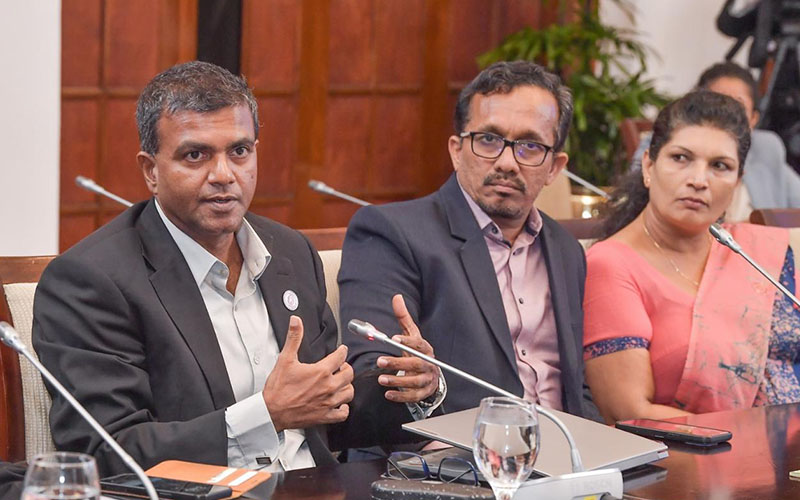
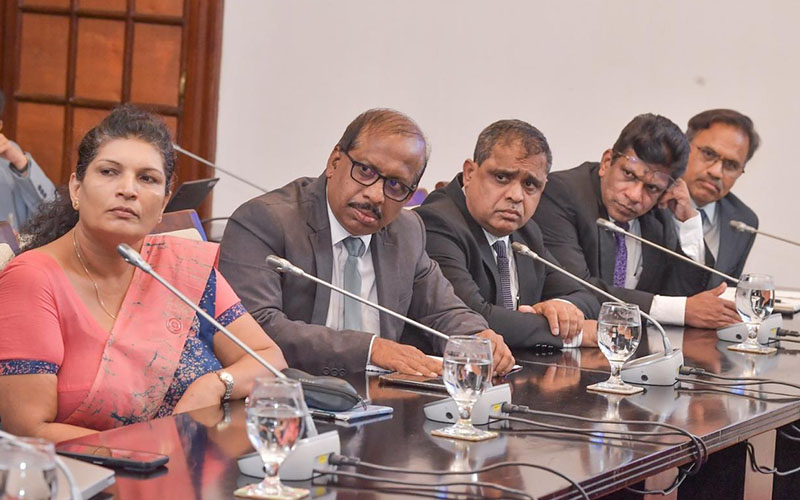
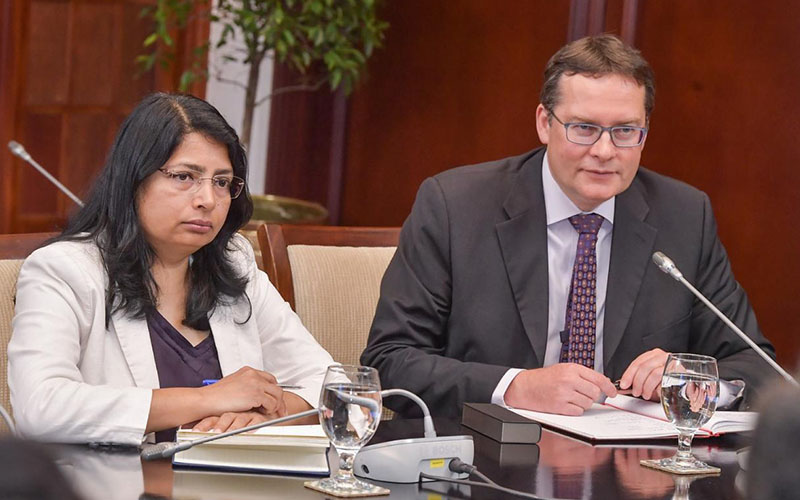
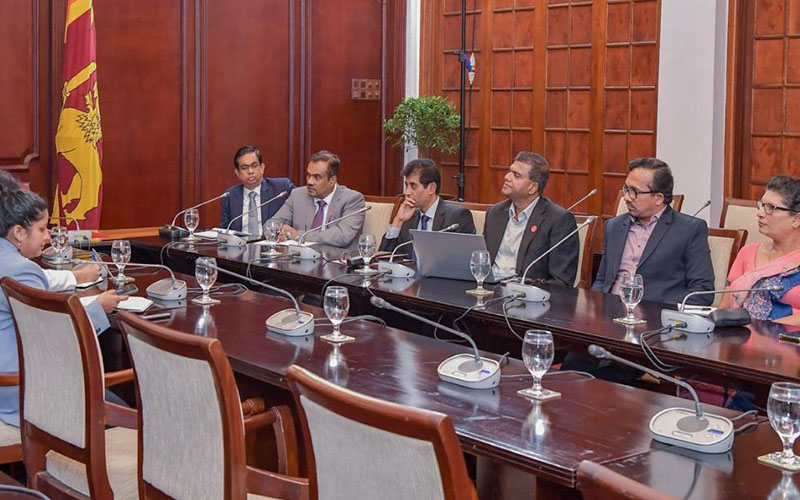
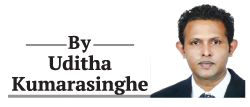
 The presidential election’s outcome has been described in flowery language: A vote for system change, the rejection of the old regime, a clarion call against corruption and cronyism, a vote against the sale of national assets, and so on.
The presidential election’s outcome has been described in flowery language: A vote for system change, the rejection of the old regime, a clarion call against corruption and cronyism, a vote against the sale of national assets, and so on. 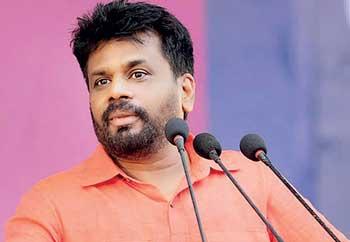
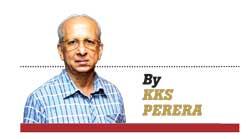 Chathuranga Abeysinghe, Executive Committee member of the National People’s Power, appeared on a TV talk show last Tuesday, where he expressed appreciation for former President Ranil Wickremesinghe’s efforts in leaving the Treasury in a stable financial condition. Abeysinghe noted that Wickremesinghe’s prudent fiscal management ensured that the incoming administration, led by President Anura Kumara Dissanayake, would have adequate financial resources to maintain government operations without facing immediate economic difficulties. He emphasised that such a gesture demonstrated Wickremesinghe’s sense of responsibility toward the country’s well-being, regardless of his political standing.
Chathuranga Abeysinghe, Executive Committee member of the National People’s Power, appeared on a TV talk show last Tuesday, where he expressed appreciation for former President Ranil Wickremesinghe’s efforts in leaving the Treasury in a stable financial condition. Abeysinghe noted that Wickremesinghe’s prudent fiscal management ensured that the incoming administration, led by President Anura Kumara Dissanayake, would have adequate financial resources to maintain government operations without facing immediate economic difficulties. He emphasised that such a gesture demonstrated Wickremesinghe’s sense of responsibility toward the country’s well-being, regardless of his political standing.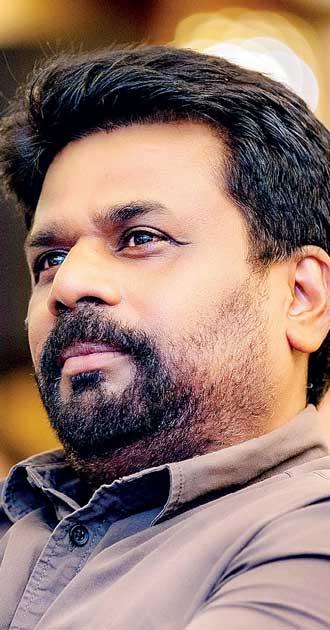 President Anura Kumara Dissanayake
President Anura Kumara Dissanayake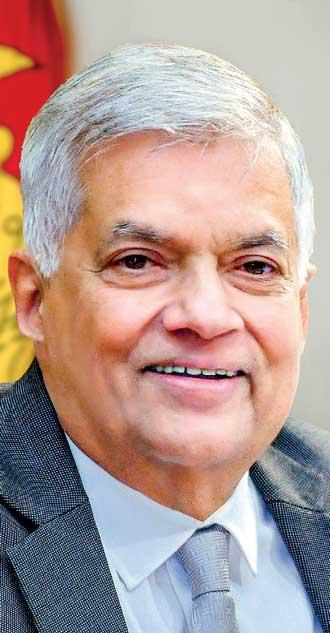 Former President Ranil Wickremesinghe
Former President Ranil Wickremesinghe